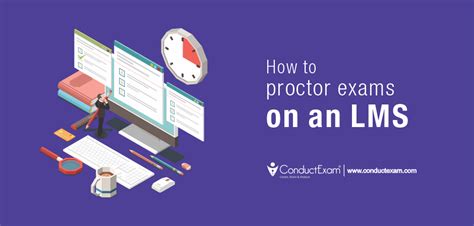In today’s digital era, where remote learning and online assessments are becoming increasingly prevalent, understanding the concept of a proctor exam is crucial. A proctor exam is a method of administering an examination online while ensuring the integrity and security of the assessment process. It involves the use of software or a remote proctor to monitor test-takers during the exam.

How Does a Proctor Exam Work?
Proctor exams typically operate through specialized software that utilizes various technologies to prevent cheating and maintain exam integrity. These technologies may include:
- Webcam and Microphone Monitoring: Monitors test-takers’ surroundings and audio, ensuring they adhere to exam regulations.
- Screen Sharing: Allows proctors to observe the test-taker’s computer screen in real-time, preventing unauthorized access to external resources.
- Biometric Authentication: Verifies the test-taker’s identity using facial recognition or other biometric data.
- Remote Proctoring: Involves a live proctor who interacts with the test-taker through video and audio, providing real-time monitoring and assistance.
Advantages of Proctor Exams
Proctor exams offer several advantages over traditional in-person exams:
- Accessibility: Allows students to take exams from anywhere with an internet connection, removing geographical barriers.
- Flexibility: Enables test-takers to schedule exams at convenient times, catering to diverse time zones and personal schedules.
- Cost-effectiveness: Eliminates expenses associated with venue rental, transportation, and proctoring staff.
- Integrity: Advanced technologies reduce cheating and maintain exam fairness, enhancing the credibility of assessment results.
Disadvantages of Proctor Exams
While proctor exams provide significant benefits, they also have some potential drawbacks:
- Technical Issues: Internet connectivity issues and software glitches can disrupt the exam process.
- Privacy Concerns: Webcam and microphone monitoring may raise privacy concerns for some individuals.
- Lack of Personal Interaction: Remote proctoring lacks the direct human interaction of in-person exams.
- Cost: Proctoring software and remote proctor services can be expensive for institutions implementing these systems.
1. Automated Proctoring
Automated proctoring software uses artificial intelligence and algorithms to detect suspicious behavior without human intervention. It relies on technologies such as webcam monitoring, screen sharing, and biometric authentication.
2. Live Proctoring
Live proctoring involves a remote proctor who monitors test-takers in real-time. Proctors can observe the test-taker’s environment, answer questions, and intervene if any irregularities are detected.
3. Hybrid Proctoring
Hybrid proctoring combines automated proctoring software with live proctoring support. This approach offers both automated monitoring and the ability for proctors to intervene in specific instances.
To maximize success in a proctor exam, it’s essential to adopt effective strategies:
- Prepare Your Environment: Ensure your testing area is well-lit, quiet, and free from distractions. Inform household members of your exam schedule to minimize interruptions.
- Test Your Technology: Check your internet connection, webcam, and microphone before the exam. Consider using a wired internet connection for stability.
- Familiarize Yourself with Software: Understand the proctoring software’s features and requirements. Practice using it before the actual exam.
- Follow Instructions Carefully: Read all exam instructions thoroughly and adhere to them strictly. Avoid using unauthorized materials or attempting to bypass proctoring software.
- Maintain Professionalism: Conduct yourself in a respectful and ethical manner during the exam. Communicate with proctors clearly and follow their directions promptly.
While proctor exams are primarily associated with online education, they can also serve as a valuable tool in various other fields:
- Job Interviews: Proctoring software can facilitate remote job interviews, allowing employers to assess candidates’ communication skills and adaptability in a controlled online environment.
- Certification Exams: Professional organizations can use proctoring systems to ensure the integrity of certification exams, ensuring the competence of candidates seeking industry-recognized credentials.
- Medical Licensing: Proctor exams can be utilized for medical licensing exams, allowing candidates to take assessments remotely while maintaining the required standards and security.
- Legal Proceedings: In legal proceedings, proctoring software can provide a secure platform for online depositions, hearings, and witness testimonies.
1. Can I use a different computer or device for my proctor exam?
Typically, you are expected to use the same computer or device that you registered with the proctoring software. Any changes must be approved by the exam administrator.
2. What if my internet connection fails during the exam?
Contact the exam administrator immediately and follow their instructions. Most proctoring software has measures to resume the exam from the point of interruption.
3. Can I pause or retake the exam?
Pausing or retaking an exam is generally not allowed unless authorized by the exam administrator. Unauthorized interruptions can affect exam integrity.
4. How does proctoring software monitor my activity?
Proctoring software may use webcam and microphone monitoring, screen sharing, and biometric authentication. It analyzes data such as eye movements, keystrokes, and screen activity to detect suspicious behavior.
5. What happens if I am caught cheating during a proctor exam?
Cheating is strictly prohibited and can lead to serious consequences, including exam invalidation, suspension, or even legal action in extreme cases.
6. Can I contact the proctor during the exam?
Yes, you can contact the proctor through the software’s chat or video call feature if you have any questions or require technical assistance.
7. How long does it take to have proctor exam results?
The time it takes to receive proctor exam results varies depending on the exam type, grading process, and institution. Consult the exam administrator for more information.
8. What are the future trends in proctor exam technology?
Emerging technologies such as artificial intelligence, facial recognition, and body language analysis are being explored to further enhance the accuracy and security of proctor exam systems.
